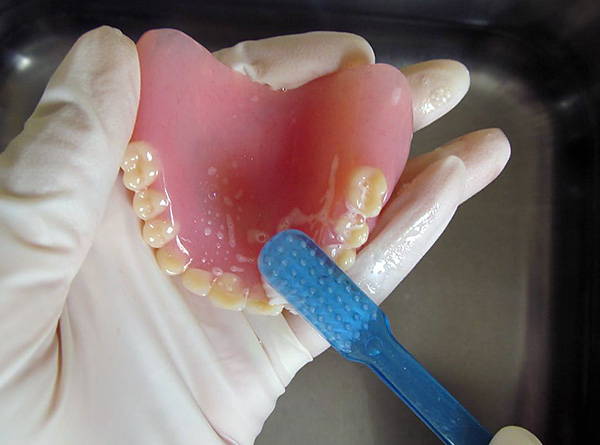
Next you will find out:
- Do removable dentures really require any special care, and if so, what it should be;
- What are currently the means to care for dentures (hygiene with the help of toothpastes and gels, effervescent tablets, ultrasound);
- What to do if you can not whiten the denture at home - can you really change it?
- What folk remedies for cleaning a removable dental prosthesis cannot be categorically applied (recommendations are given that will save you from pointless experiments);
- What can threaten the lack of care for a denture and how to properly store it in order to maximize the service life and not to spoil ahead of time ...
When it comes to the use of a removable denture, it is important to understand that not only its lifespan, but the state of the oral cavity as a whole may depend on the care taken for this construction.At the same time there is an opinion that, supposedly, the teeth are artificial, and the plastic prosthesis itself - nothing will happen to it, because it cannot “rot,” like its own teeth, and bacteria are unlikely to destroy it.
Well, it should be noted that with full removable prosthetics (that is, with completely edentulous jaws), because of such neglect of hygiene, the patient risks losing at least money for the prosthesis, and as a maximum, gets rotten smell from the mouth and difficult healing ulcers on mucous membranes. And owners of partial dentures in the absence of proper care for the structure in addition can quickly lose supporting teeth, for which the prosthesis is fixed in the mouth (for example, due to the development of periodontitis).
Why it happens?
The fact is that neglect in relation to the care of a removable prosthesis will lead to the fact that microbial plaque will accumulate in various areas of the structure (especially under the base, at the places of its transition to the rows of artificial teeth, areas of attachment of clasps, etc.). Yes, artificial materials themselves will not “rot”, but will be an excellent carrier for colonies of microorganisms.
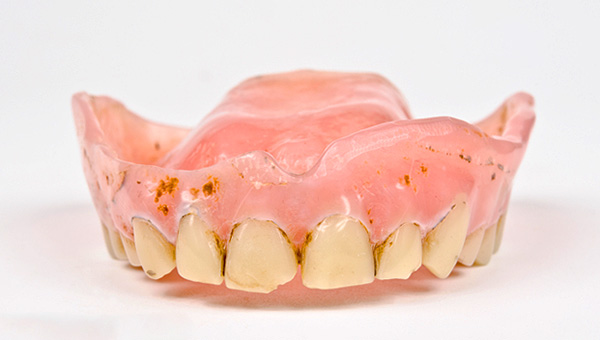
On a note
Initially, bacterial plaque on a denture is soft, loose in its structure, and relatively easy to remove with a regular toothbrush. However, in the absence of regular hygienic procedures, such a deposit is subsequently gradually mineralized, pigmented and compacted, and often even tartar is formed that traumatizes the gums. As a result, colored areas, stains, significantly reducing aesthetics, appear on the denture.
All this together not only creates an unpleasant odor from the mouth, but also threatens the remaining teeth with the appearance of mobility (loosening), up to the necessity of their removal.
Bacterial plaque can form on any plastic prosthesis, whether it be an acrylic prosthesis, nylon, silicone or polyurethane.
Next, we will look at how to properly care for a denture and how to store it in the intervals between wearing so that the design does not lose its functional and aesthetic characteristics and does not harm the oral mucosa.
General principles of care for partial and full removable dentures of various materials
Regardless of the type of denture (plate acrylic, soft nylon, byugelny or even a compact prosthesis-butterfly), in the design itself there are always zones that accumulate bacterial plaque.
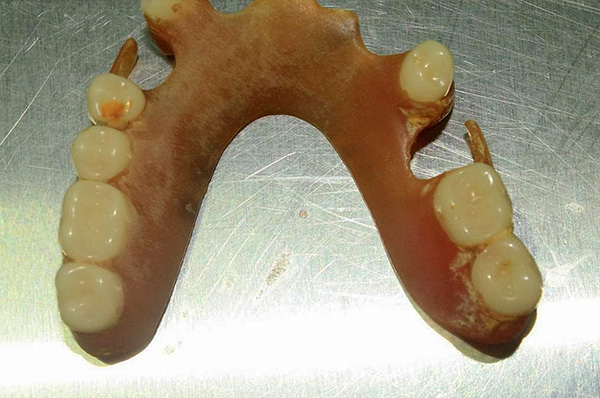
Therefore, care of the prosthesis implies the following principles:
- Binding. Even if it seems to you that all the surfaces of the construction are perfectly clean, it is still necessary to carry out their hygienic cleaning (at the initial stage, the bacterial deposit has a thickness of only a few microns and is visually imperceptible);
- Regularity. It is necessary to take care of the prosthesis every day and not just once - almost as carefully and regularly as they take care of their own teeth;
- An integrated approach to hygiene. It is necessary to combine different methods of cleaning the prosthesis - from simple rinsing with water and ending with the periodic use of special tools (they will be described in more detail below).
Here is a useful reminder that will help keep the denture clean:
- After each meal, you should rinse the prosthesis with water to remove food residue. If you do not use a cream for fixing a denture, then the structure should be removed and simply rinsed in running water until all visible food particles have been washed.If cream is used, then the design does not have to be removed - it is enough to rinse your mouth with water;
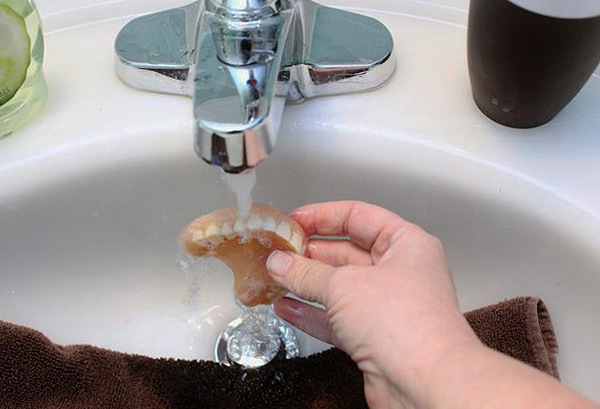
- In addition, the daily denture hygiene should be carried out using a soft toothbrush with a non-abrasive paste (any children's toothpaste that can be used for 0 years is suitable - their abrasiveness index is minimal).
Important
It is strictly forbidden to use ordinary toothpaste and, especially, whitening, to clean a removable denture. The average abrasiveness of conventional toothpastes is at level 70 (RDA 70 can be written on the package), while whitening can reach up to 200. When the abrasive acts on plastic, micro-scratches are formed, and the smooth surface of the denture becomes rough over time - such a surface also more actively stick pollution.
Children's toothpaste RDA is usually in the range from 0 to 20.
- Approximately 1-2 times a week, it is recommended that the prosthesis be treated with special means - as a rule, they are sold as effervescent tablets and contain components (proteolytic enzymes, antiseptics) that dissolve plaque and kill bacteria that live on the prosthesis. An alternative to using effervescent tablets for cleaning dentures is the use of an ultrasonic bath - with its help it is possible to almost perfectly clean the denture (plaque is removed, odor, bacteria are destroyed);
- About 1 time in 6-12 months, professional cleaning of the denture is recommended at the dentist;
- Most types of prostheses should be stored in a humid environment, since otherwise the product may become deformed when dried. For storage, you can use ordinary water, or special solutions for the storage of dentures, which are sold in pharmacies (this is the preferred option). When soaking the prosthesis, make sure that it is completely covered with the solution (or water). Do not put the structure in hot water, as this may lead to its deformation;
- In the case of using a partial denture, one should not forget about careful hygiene of the teeth remaining in the mouth.
Special hygiene products: pastes, gels, effervescent tablets and ultrasonic baths
A classic and very effective option of mechanical cleaning of removable dentures is the use of a toothbrush and toothpaste.
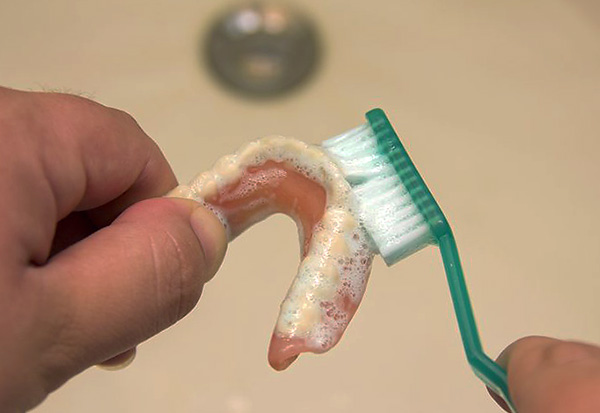
Toothpastes for the care of the prosthesis and their remaining teeth in the mouth in most cases should be different. Usually, baby toothpaste is used to take care of a removable design, and ordinary adult toothpaste is used to take care of your teeth and gums. In order to save and simplify, in both cases it is not recommended to use only one children's paste, since its properties may not be enough for good oral hygiene of an adult.
On a note
Instead of children's toothpaste, you can use specialized tools in the form of gels for daily cleaning of dentures - for example, Dentipur Gel, CURAPROX BDC, etc.
The situation is similar with toothbrushes - for the remaining teeth in the mouth that brush is suitable that is tailored to the individual condition of the teeth and gums brush with soft bristles). To clean the removable design, a soft toothbrush is always used (on the package can be written Soft or Sensitive).
Well suited brush with a bilateral arrangement of the bristles - for the hygiene of the inner and outer surfaces.
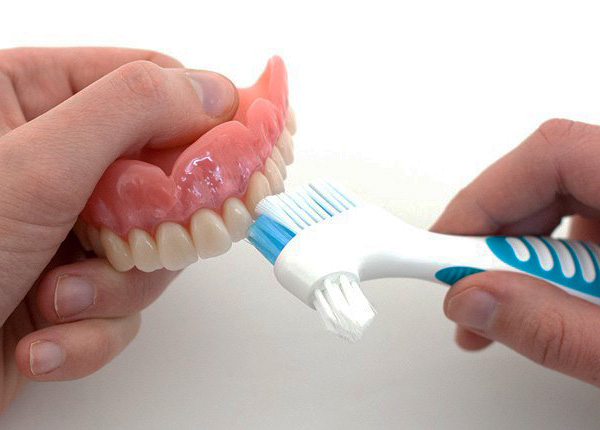
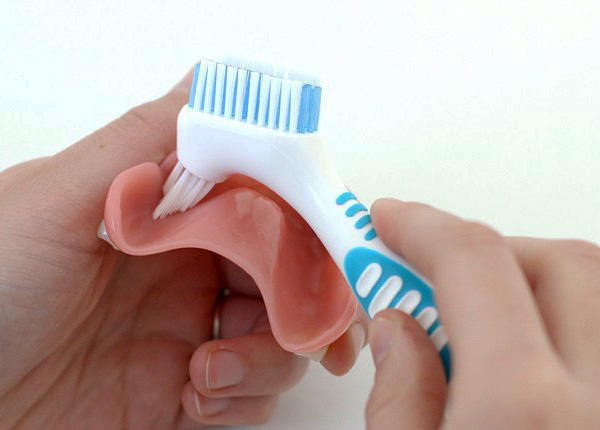
Feedback:
“I have been walking with a false jaw for about a month now. I had to remove 5 teeth, only two remained on top, so there wasn’t much choice. What can I say ... I thought it would be worse, but so normal. Just trying to approach with a bit of humor. After installing the jaw, I barely remove it, just to clean it. No one knows that I have a denture on top, not even my husband. ”
Elena, Moscow
However, for complete care of the prosthesis, simple mechanical cleansing may not be enough, therefore, today special tools have been developed for additional chemical exposure. Most of these products are effervescent tablets - they are placed in water to prepare a cleaning solution.
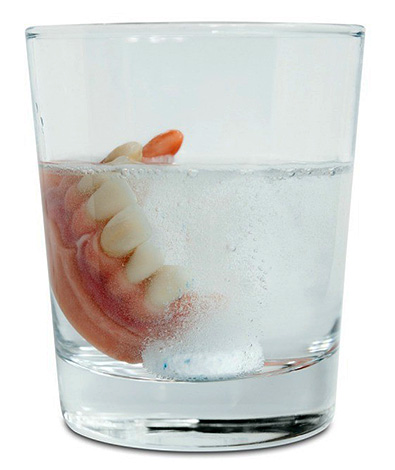
The principle of action of all tablets for the hygiene of removable structures is the dissolution of plaque with the help of enzymes. At the same time, the protein matrix is destroyed even by partially mineralized plaque, which, in combination with mechanical cleansing, gives a particularly well-pronounced effect (after keeping in solution, it is useful to clean the structure with a toothbrush).
On a note
At home, using effervescent tablets for cleaning dentures, it is also possible to maintain a good appearance of the structure - it does not darken, pigmented spots are not formed on its various surfaces. An important contribution is made not only by proteolytic enzymes that dissolve plaque, but also by active oxidizing agents (usually potassium persulfate and sodium perborate), which discolor pigments by their oxidation.
Examples of the most popular effervescent tablets today for cleaning dentures:
- Protefix;
- Corega;
- ROCS;
- Lacalut Dent.
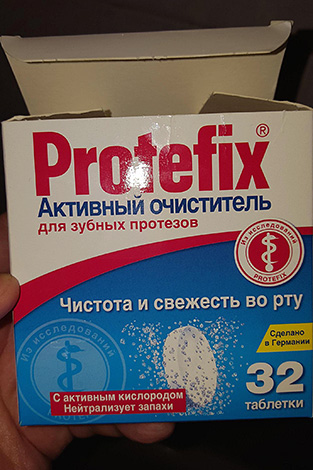
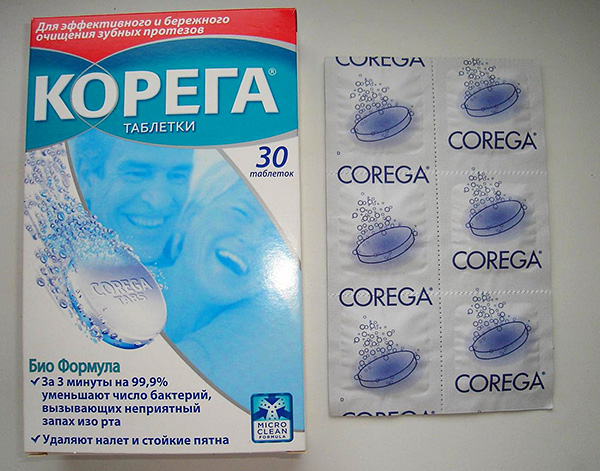
As an additional method of dental hygiene, the use of ultrasonic baths can be noted. The principle of their operation consists in peeling off plaque from any surfaces (acrylic plastic, nylon, metal, silicone, polyurethane, polypropylene, etc.) due to the impact of mechanical ultrasonic vibrations transmitted in a liquid medium. Due to the action of ultrasound is achieved not only cleansing, but also antibacterial effect.
The cost of high-quality ultrasonic trays ranges from 3000 rubles.
Professional hygiene methods for removable dentures
If you properly clean removable dentures and provide them with proper care, you can maintain them in excellent condition for a long time. Despite this, at least once a year it is recommended to make an assessment of the condition of the construction by a professional (orthopedic dentist), who can objectively assess how much the level of hygiene corresponds to what is necessary.
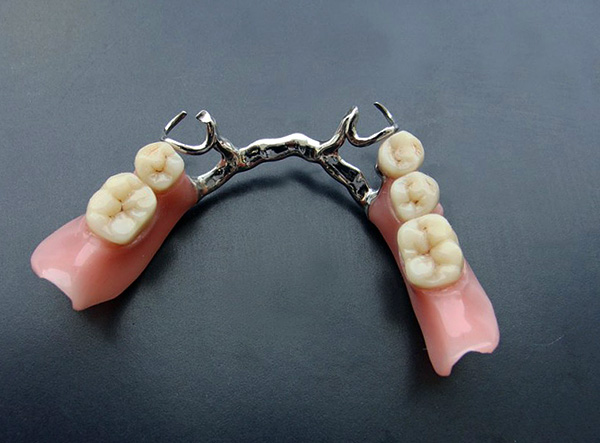
This is especially true for people who have bad habits that lead to fast and persistent staining of plaque (smoking, frequent use of coffee, wine). Artificial teeth (and other surfaces of the structure) that have yellowed during the operation of a removable denture can be whitened at home, and in this case it is better to carry out this process in the dentist's office (or in the dental laboratory).
It should be understood that darkened removable dentures not only look ugly, but can provoke inflammatory processes in the oral cavity - for example, from the side of the mucous membrane on which the design rests. The result may be pain, burning, swelling, ulcers.
To prevent an adverse outcome, you should promptly contact your dentist in order to remove plaque and stone from all surfaces of the prosthesis. Usually, the grinding and polishing of the structure, as well as cleaning with ultrasonic tools, is carried out in the dental laboratory.
Folk remedies for the care of dentures: what options absolutely can not be used
What are only folk remedies for cleaning dentures are not trying to apply at home: from vinegar and lemon juice to hydrogen peroxide and alcohol-containing liquids.
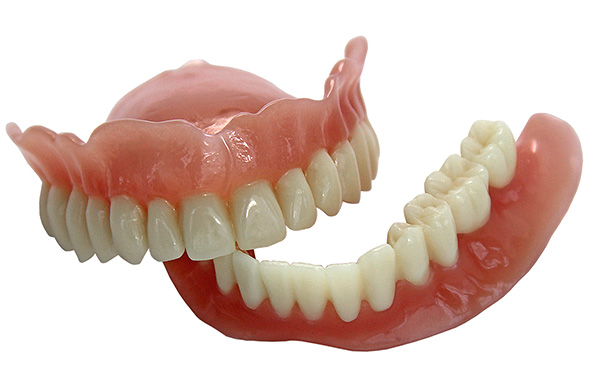
It is interesting
An example of one of the most ridiculous advice on caring for a denture is the recommendation to soak it in kefir.
However, not all folk recipes are harmless - there is often a risk of irreparably spoiling the structure.
In order to protect against meaningless experiments in advance, the following are those that may pose the greatest danger to the state of the prosthesis:
- On the Internet you can find many examples and reviews that mention the use of tooth powder for cleaning dentures - they say, it cleans better than toothpaste.So, he cleans, maybe better, but at the expense of his abrasive properties he scratches plastic surfaces, making them convenient for attaching plaque and developing colonies of microorganisms here;
- Another variation on the subject of making a composition that would clean better than toothpaste is a combination of soda and lemon juice (a couple of drops of lemon juice are taken on a pinch of soda). Yes, sodium citrate formed during a chemical reaction, being a strong complexing agent, will contribute to the destruction of the mineral matrix of hard plaque, but soda, which is present in excess, will perfectly scratch the prosthesis, worsening its characteristics. Therefore, this option of cleaning plaque is unacceptable;
- Due to inexperience, some try to disinfect a removable denture with a strong solution of potassium permanganate (potassium permanganate). This usually leads to persistent staining of construction materials in a yellowish-brown color (the smallest insoluble particles in hydrated manganese dioxide are embedded in the porous plastic);
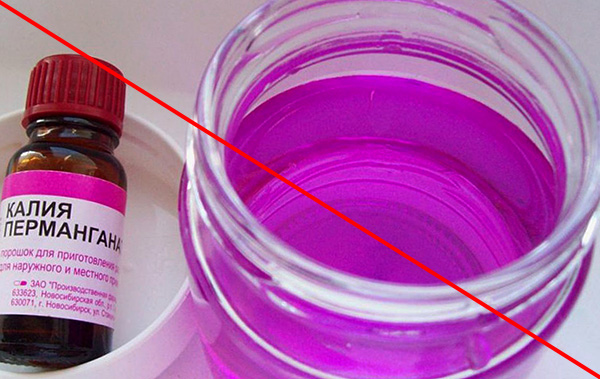
- An attempt to disinfect the prosthesis in hot water leads to deformation of the structure;
- The use of whiteness (an aqueous solution of sodium hypochlorite) can be dangerous for metallic elements of the structure (for example, for clasps or the basis of clasp denture).
And etc.
Do not use metal objects to remove food debris from parts of the prosthesis - this can lead to scratches and chips.
In general, many traditional methods of cleaning dentures not only fail to cope with their task, but simply dissolve, corrode, paint or deform the structure, making it unusable.
What threatens the lack of care for a denture
Not only the mindless use of folk methods can create problems for owners of removable dentures. Numerous troubles, complicating life, can also provoke non-compliance or complete denial of hygiene.
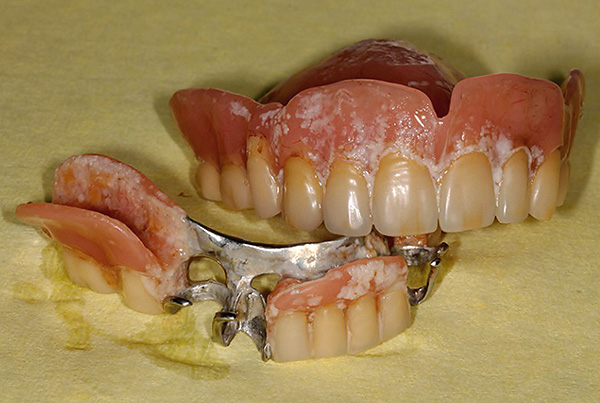
With a lack of hygiene, the most common problems are:
- Inflammation of the type of gingivitis, periodontitis, stomatitis (there is even such a thing as prosthetic stomatitis);
- Ulcers in the zone of constant load or injury on the background of dental plaque;
- Putrid odor from the mouth;
- The development of caries and its complications on the teeth preserved in the oral cavity due to the accumulation of plaque on them;
- The loosening of the abutment teeth on the background of periodontitis;
- Violation of taste sensations (unpleasant taste in the mouth);
- The appearance of age spots on the prosthesis in connection with staining of bacterial plaque dyes from food;
And etc.
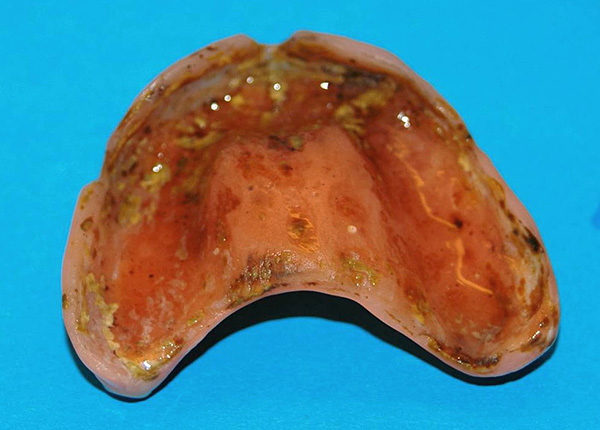
As you understand, this is not only about the aesthetic side of the issue, which is certainly important for any holder of a removable denture. If you do not follow the rules of hygiene, then pathological processes can even lead to the appearance of a malignant tumor in the zone of chronic injury to the mucous membrane.
After delivery of the prosthesis, the orthopedic dentist hands over the product care sheet or simply gives valuable instructions - they should not be neglected.
How to properly store a removable denture to extend its service life and not to spoil ahead of time
Most removable dentures manufactured today should be stored in a humid environment - drying out plastic elements can lead to their deformation, which is not always restored when the product is re-wetted.
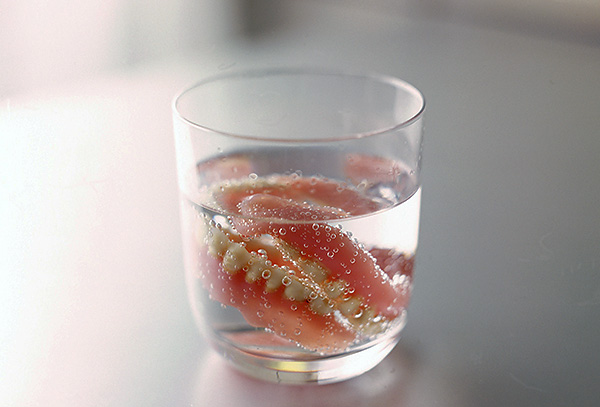
After removal (for example, at night), the prosthesis is lowered into a special antiseptic solution for prostheses (can be bought at any pharmacy), or simply into water. It is important to ensure that all parts of the structure are completely immersed in the liquid.
On a note
Most experts do not recommend removing the newly made prosthesis at night due to the fact that getting used to it in this case is much faster. To do this for about 2 weeks will have to go with a removable design in the mouth almost all the time, only briefly removing it. However, in the future, the removable denture still needs to be regularly removed so that the mucous membranes in contact with it should rest (at least 6 hours a day).
If you have experience using a removable denture - share it, leaving a review at the bottom of this page.
Useful video: how to care for dentures and fully live with them
Specialist's comments on the important nuances of removable prosthetics

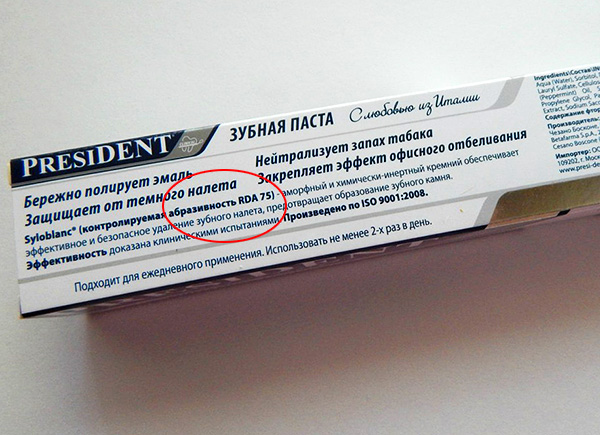
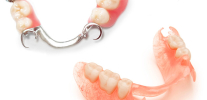
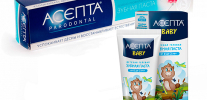
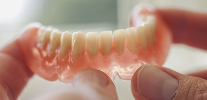
Full top silicone prosthesis - it can only be worn with korega, otherwise it flies. But the doctor says that everything is fine. What to do?
Hello. Patients do often often face a poor fixation of a complete denture - this is primarily due to the fact that the usual full denture rests on the soft gingiva and is supported on it only by vacuum, sucking on soft tissues. When chewing and talking, mobility of the prosthesis arises, and it can lose its vacuum fixation. In order to improve the fixation of prostheses, it is necessary to relocate once a year, but to avoid this problem fully will not work.In such cases, if the patient is not ready to put up with this, with the lack of teeth, dental implants are installed as supports. The implantation method is determined by the implantologist according to the results of X-ray diagnostics. Usually it is only this way that manages to completely get rid of discomfort.
Is it possible to clean a removable denture with soap?
Hello Vladimir! To clean a removable denture, you can use both soap and toothpaste. I recommend cleaning the denture 1 time a day (in the evening) with a soft toothbrush. And during the day, after eating, rinse the mouth and the prosthesis itself.
To clean the denture, it is not recommended to use a hard toothbrush and whitening toothpastes, as they are highly abrasive and the denture becomes “rough”, which leads to the accumulation of microorganisms and food particles on it.
I wear a removable denture for about 3 years. I clean my, using Koreg tablets for processing, everything is as it should be. The question is: I got a raid and cracks in my tongue. Could this be due to a prosthesis?
Hello Tatiana. The development of the problem you indicated due to a removable denture is unlikely. Most likely, this is a consequence of a disease of the mucous membrane of the tongue (possibly a fungal infection). I recommend to contact a periodontist to clarify the true cause of pathology.
Thank.
I wear dentures (upper and lower) for 5 years. The first two years I got used to it - the doctor got not very polite, she didn’t go to her anymore. I did it myself + helped the Internet. Now the problem is dry mouth, I can not take hot and sour food, jammed. But, too, I think I can handle it. Thanks to the internet and you!
Here are the other day and I have to put on a full removable denture. So it happened in 52 years. Survived, crying. Tell us how you got used and what helped during this period?